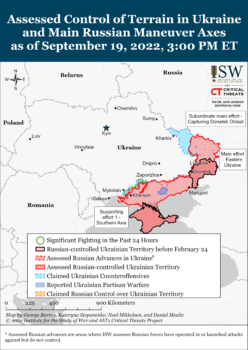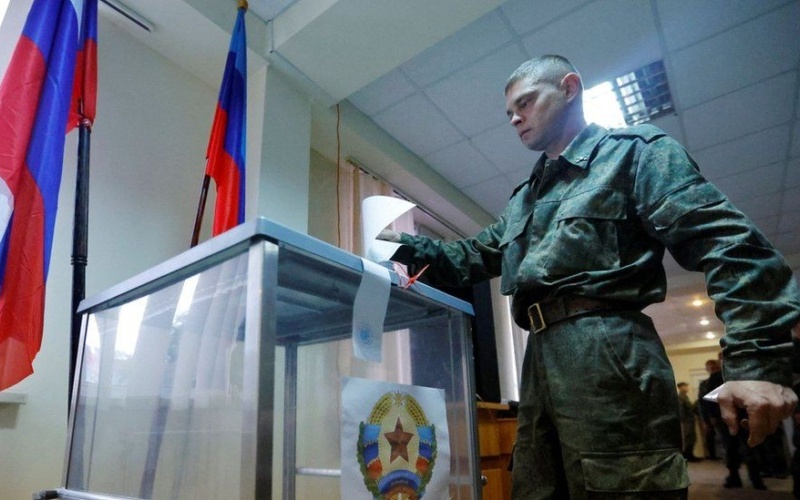A soldier casts his vote in a staged referendum for Russian annexation, Luhansk region, eastern Ukraine, September 23, 2022 (Reuters)
Monday’s Coverage: Putin’s 5th Failed Mobilization

Source: Institute for the Study of War
UPDATE 1856 GMT:
Amid three gas leaks in the Baltic Sea and reports of drone activities in the North Sea, Norway is heightening security at oil and gas installations.
“Based on the information we have seen so far, much indicates acts of sabotage,” said Norwegian Oil and Energy Minister Terje Aasland. The government has consulted with the armed forces and operators of oil and gas installations, both land and offshore sites.
On Monday, Norway’s Petroleum Safety Authority urged greater vigilance over unidentified drones flying near Norwegian offshore oil and gas platforms.
Gas leaks were reported from the operational Nord Stream 1 and dormant Nord Stream 2 underwater pipelines on Monday. Both carry gas from Russia to Germany, but the Russians have restricted supplies and Vladimir Putin has threatened a complete cut-off.
On Tuesday, Denmark’s military posted an image of gas bubbling on the surface of the Baltic Sea after the “unprecedented” damage.
Adding weight to speculation of sabotage, Denmark’s Geological Survey reported two seismic shocks resembling blasts rather than earthquakes on Monday.
The first was at 0003 GMT, measuring 2.3 on the Richter scale, and the second at 0503 GMT, measuring 2.1.
UPDATE 1209 GMT:
The UN’s human rights office has expressed concern over almost 2,400 arrests in Russia since Vladimir Putin’s “partial mobilization” last Tuesday.
Spokeswoman Ravina Shamdasani said, “We are deeply disturbed by the large number of people who have reportedly been arrested.”
She cited “credible reports some 2,377 demonstrators had been arrested … in various locations across the country. It is unclear how many people remain in detention.”
We stress that arresting people solely for exercising their rights of peaceful assembly and freedom of expression constitutes an arbitrary deprivation of liberty.
We call for the immediate release of all those arbitrarily detained and for the authorities to abide by their international obligations to respect and ensure the rights to freedom of expression and of peaceful assembly.
UPDATE 0652 GMT:
Russian attacks on the Kharkiv region in northeast Ukraine have killed nine civilians.
Governor Oleh Synyehubov said a 15-year-old was killed in Pervomaiskyi, and “seven dead people were found under the rubble”. In Dvorichna, a first responder was slain.
Shelling of Kupyansk, liberated by Ukrainian forces almost three weeks ago, burnt down a church school, an outbuilding, and a shop. Five people were hospitalised.
In the Donetsk region, Russian attacks killed three civiians and injured 13.
UPDATE 0640 GMT:
Japan has protested Russia’s detention and abuse of a Japanese consul.
The Russian State security service FSB said Monday that it seized the consul, Motoki Tatsunori, for suspected espionage. He was released after a few hours and ordered him to leave the country.
The spokesperson for the Japanese Government, Hirokazu Matsuno, said Tatsunori was blindfolded, restrained, and treated in an “intimidating manner”.
Citing “a clear violation of the Vienna Convention on Diplomatic Relations”, Matsuno said Japan has lodged a “strong protest” about the detention and signalled it may retaliate.
The Foreign Ministry summoned the Russian Ambassador Mikhail Galuzin and demanded that Moscow make a formal apology.
Foreign Minister Yoshimasa Hayashi told reporters of the required apology over the “coercive interrogation”. He said Tatsunori had not engaged in any illegal activity.
Earlier on Monday, Japan banned exports of chemical weapons-related goods to Russia and added 21 Russian organisations such as science labs to its sanctions list.
Matsuno said after the Cabinet’s authorization: “Japan is deeply concerned about the possibility of nuclear weapons used during Russia’s invasion of Ukraine.”
ORIGINAL ENTRY: UK military intelligence assesses that Vladimir Putin may announce the annexation of occupied Ukrainian territory on Friday.
Putin is scheduled to address both houses of the Russian Parliament, following today’s completion of staged “referenda” in the occupied areas in eastern and southern Ukraine.
The speech comes amid Ukrainian counter-offensives that have regained territory, particularly in the northeast and east, and Putin’s order for “partial mobilization”, which has caused widespread turmoil and discontent within Russia.
See also EA on International Media: Putin’s Desperation Over His Failing Ukraine Invasion
The British analysts summarize:
Russia’s leaders almost certainly hope that any accession announcement will be seen as a vindication of the ‘special military operation’ and will consolidate patriotic support for the conflict.
This aspiration will likely be undermined by the increasing domestic awareness of Russia’s recent battlefield setbacks and significant unease about the partial mobilisation announced last week.
Chilling exchange between a hysterical Russian mother whose son was probably mobilized for the war in Ukraine.
"Don't you dare take our children! I don't want to murder people!" she screams at an official.
He answers in typical fashion: "There are laws, and we must follow them" https://t.co/A8HVjM0UJF
— Matthew Luxmoore (@mjluxmoore) September 26, 2022
Russia State media declared on Monday that the “referenda” are valid, a day before they end. They claimed turnout of 86.89% in the Donetsk region and 83.61% in Luhansk in the east, and 63.58% in Kherson and 66.43% in Zaporizhzhia in the south.
The US-based Institute for the Study of War takes apart the dubious numbers:
Turnout even in a free and fair referendum, rather than the Kremlin’s sham plebiscite, would almost certainly be much lower….
Even in peacetime, Ukrainians do not turn out to vote at rates as high as what Russian occupation officials are reporting; the first round of Ukraine’s 2019 presidential election saw only a 62.8% turnout.
The ISW agreed with UK military intelligence on the Russian timetable for annexation “before or shortly after October 1”. It cites that with “the start of Russia’s normal fall conscription cycle”, the step would “enable the forced conscription of Ukrainian civilians to fight against Ukraine”.
However, like the British analysts, the ISW says the Kremlin “faces a daunting task in trying to calm the Russian people while still mobilizing enough men to keep fighting”. It notes documented protests in at least 35 Russian settlements on Sunday and at least 10 on Monday, with the detention of several hundred women in Yakutsk in eastern Russia.
Spoke to a Russian reservist who fled to Kazakhstan this weekend. He spoke of enormous lines, and said the Russian train he took to the border was packed with young Russian men."I can tell you honestly those leaving are decent men, smart, educated, leaving wives and kids behind." pic.twitter.com/h26905fL6w
— Matthew Luxmoore (@mjluxmoore) September 26, 2022

